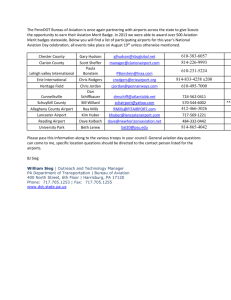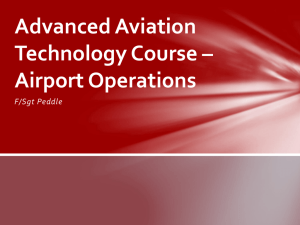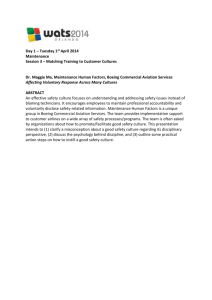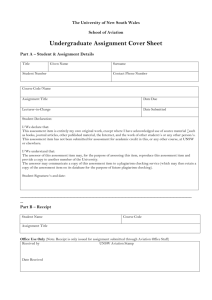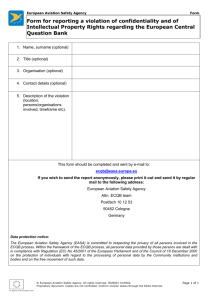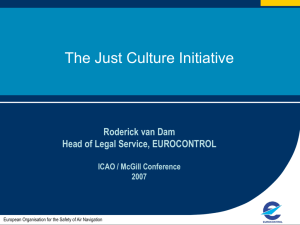TOR-ImprovementofAviationSecurityinAfrica - Aviation Africa-EU
advertisement
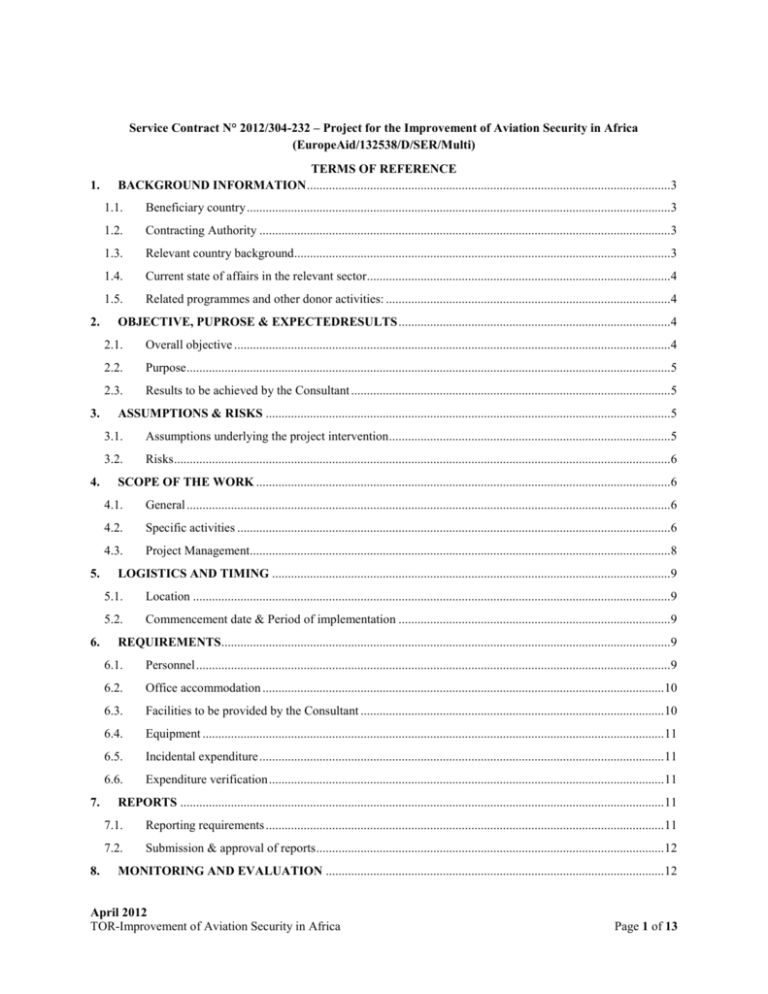
Service Contract N° 2012/304-232 – Project for the Improvement of Aviation Security in Africa (EuropeAid/132538/D/SER/Multi) 1. 2. 3. 4. 5. 6. 7. 8. TERMS OF REFERENCE BACKGROUND INFORMATION ...................................................................................................................3 1.1. Beneficiary country ......................................................................................................................................3 1.2. Contracting Authority ..................................................................................................................................3 1.3. Relevant country background.......................................................................................................................3 1.4. Current state of affairs in the relevant sector................................................................................................4 1.5. Related programmes and other donor activities: ..........................................................................................4 OBJECTIVE, PUPROSE & EXPECTEDRESULTS ......................................................................................4 2.1. Overall objective ..........................................................................................................................................4 2.2. Purpose .........................................................................................................................................................5 2.3. Results to be achieved by the Consultant .....................................................................................................5 ASSUMPTIONS & RISKS ................................................................................................................................5 3.1. Assumptions underlying the project intervention .........................................................................................5 3.2. Risks .............................................................................................................................................................6 SCOPE OF THE WORK ...................................................................................................................................6 4.1. General .........................................................................................................................................................6 4.2. Specific activities .........................................................................................................................................6 4.3. Project Management.....................................................................................................................................8 LOGISTICS AND TIMING ..............................................................................................................................9 5.1. Location .......................................................................................................................................................9 5.2. Commencement date & Period of implementation ......................................................................................9 REQUIREMENTS ..............................................................................................................................................9 6.1. Personnel ......................................................................................................................................................9 6.2. Office accommodation ............................................................................................................................... 10 6.3. Facilities to be provided by the Consultant ................................................................................................ 10 6.4. Equipment .................................................................................................................................................. 11 6.5. Incidental expenditure ................................................................................................................................ 11 6.6. Expenditure verification ............................................................................................................................. 11 REPORTS ......................................................................................................................................................... 11 7.1. Reporting requirements .............................................................................................................................. 11 7.2. Submission & approval of reports .............................................................................................................. 12 MONITORING AND EVALUATION ........................................................................................................... 12 April 2012 TOR-Improvement of Aviation Security in Africa Page 1 of 13 8.1. Definition of indicators .............................................................................................................................. 12 8.2. Special requirements .................................................................................................................................. 13 April 2012 TOR-Improvement of Aviation Security in Africa Page 2 of 13 1. BACKGROUND INFORMATION 1.1. Beneficiary country The beneficiary region is ACP, sub-Saharan Africa 1.2. Contracting Authority The Contracting Authority will be the ACP Secretariat. The mode of implementation will be partially decentralized management through the signature of a Financing Agreement with the ACP Secretariat, in accordance with Articles 21 to 24 of the Financial Regulations of the 10th EDF. 1.3. Relevant country background In Africa, the aviation industry is vital for socio-economic development, promotion of international trade, tourism and regional integration. It is particularly important due to the size of the continent and physical barriers such as deserts, tropical forest and mountains and the limited land-based transport network. The expansion of air services is a necessary condition for the development of Africa’s economy and export base as well as the expansion of tourism to the region. Air transport in Africa represents some 3% of total world traffic, although it is a huge untapped market with about only 10% of its population using air services. Air traffic forecasts produced by Boeing1 suggest that air passenger traffic in Africa will grow by about 5.1% per annum and cargo traffic by 5.3% per annum to 2030, which is significantly higher than the expected growth in both Europe and North America, and in line with average global traffic growth over this period. Despite these traffic growth projects, the aviation sector in Africa is hampered by the limited use of satellite navigation technology and poor record in aviation safety and security. Following the first EU-Africa High Level Conference on aviation held in Windhoek in April 2009, a number of areas were addressed for the safe and sustainable development of the growing air services between the EU and Africa and within Africa. These included market liberalization, air safety and security, air traffic management, bilateral relations between the EU and AU and engagement on the application of environmental protection measures. In the same spirit, the 2009 “Communication Partnership between the European Union and Africa-Connecting Africa and Europe: working towards strengthening transport cooperation” aimed to reinforce cooperation in this key sector for developing the region, by putting EU experience at the disposal of the African continent. Also, it was proposed to hold a Forum, if possible, every year to discuss this cooperation. The 1st Forum took place in October 2009 in Naples and the following actions were outlined as a road map for cooperation in the Naples Declaration: 1 Organization of an annual Africa-Europe Transport Forum; Capacity building for African transport actors particularly in the areas of safety and security; Identification of priority interconnection projects between the two continents, such as the introduction of GNSS/EGNOS; Putting in place innovative mechanisms for financing transport projects; Monitoring activities in order to strengthen the EU-Africa Infrastructure Partnership. ‘Current Market Outlook 2011-2030’, The Boeing Company April 2012 TOR-Improvement of Aviation Security in Africa Page 3 of 13 A second Forum, at Commissioner and African Union Commissioner level, will be organized in 2012 in order to comply with the Communication and the commitments taken by both parties in Naples Declaration. This forum would report on implementation of the above-mentioned roadmap annexed to the Naples Declaration, discuss new possible areas of co-operation, and, together with the High Representatives of the EU-AU Infrastructure Partnership, identify possibly financial instruments. The project “Support to the air transport sector and satellite service application; improvement of aviation security in Africa” forms a component of a larger EURO 9.0 Mio. Intra-ACP project (‘Support to the Air Transport Sector and Satellite Service in Africa’) which resulted from the Naples Declaration in 2009. 1.4. Current state of affairs in the relevant sector The extent and quality of aviation security at African airports varies considerably from state to state. Some airports have implemented sound security programmes in accordance with ICAO Annex 17 2 provisions- whilst others, due to a lack of national legislation and oversight, equipment or staff training have failed to meet those requirements – and require corrective actions following ICAO’s Universal Security Audit Programme (USAP). Although the ICAO regional offices in Africa maintain a pool of qualified aviation security inspectors who give guidance and assistance to states, this is diminishing as many inspectors leave Africa for better-paid work outside the continent. The possibility of a terrorist threat is key consideration by many EU and other airlines in establishing new services to a county. Even at airports where some basic security procedures have been adopted, many airlines insist on carrying their own security checks at their own expense. Although some donor assistance has been (and continues to be) provided in this area (see Section 1.5), there are still several African states which fail to meet the necessary aviation security standards. This project aims to provide assistance at the continental, regional and individual country level to meet these requirements. 1.5. Related programmes and other donor activities: In addition to ICAO’s USAP Programme, technical assistance and training in aviation security is currently being funded by the World Bank (covering West and Central Africa) and through the ASACA Programme, financed by the French Ministry of Foreign Affairs and ASECNA. The ASACA Programme, which covers all 16 French speaking African States and Nigeria, funds training courses given by African ICAO certified aviation security instructors. It is envisaged therefore that this project component will have a particular focus in Eastern and Southern Africa. Assistance should be focused in those countries/airports which require corrective action(s) following the ICAO USAP audits, present a higher than average security risk, have direct air traffic to Europe and have shown genuine interest in improving aviation security. DG MOVE will assist in identifying those countries, in cooperation with DG HOME. 2. OBJECTIVE, PUPROSE & EXPECTEDRESULTS 2.1. Overall objective The key programme objectives are: (i) Implementation of international aviation security regulations at the regional and national level; Annex 17 to the Chicago Convention – ‘Security: Safeguarding International Civil Aviation Against Acts of Unlawful Interference’ 2 April 2012 TOR-Improvement of Aviation Security in Africa Page 4 of 13 (ii) Improvement of aviation security through technical assistance and training provided at regional and national level. These key project objectives contribute towards the over-riding objectives of contributing to Africa’s economic growth, connectivity and the promotion of regional integration. 2.2. Purpose The purpose of this contract is as follows: Technical assistance and training in aviation security is currently being funded by the World Bank (covering West and Central Africa) and through the ASACA Programme, financed by the French Ministry of Foreign Affairs and ASECENA. The ASACA Programme, which covers all 16 French speaking African States and Nigeria, funds training courses given by African ICAO certified aviation security instructors. It is envisaged therefore that this project component will have a particular focus in Eastern and Southern Africa. Assistance should be focused in those countries/airports which require corrective action(s) following the ICAO USAP audits, present a higher than average security risk, have direct air traffic to Europe and have shown genuine interest in improving aviation security. DG MOVE will assist in identifying those countries, in cooperation with DG HOME. 2.3. Results to be achieved by the Consultant The results to be achieved by the Consultant are: Establishment of a suitable legislation and operational framework for aviation security at the regional and, where appropriate, the national level; Reduction in the number of ACP States failing to meet ICAO standards in the number of corrective actions required; Development of appropriately trained aviation security inspectors and security personnel; Provision of specialist equipment for suitable aviation training schools in the sub-Saharan African region The consultant is expected to establish measurable project indicators (such as the reduction in the number of corrective actions required under the USAP audits, the number of trained aviation security personnel, etc.) to assess the on-going performance and final results of the project. 3. ASSUMPTIONS & RISKS 3.1. Assumptions underlying the project intervention It is assumed that suitable methods can be deployed to keep trained staff (e.g. aviation security inspectors) within Africa. This can be partially mitigated by legal conditions for trainees; e.g. they cannot take up employment overseas within two years of completing the training. It should also be noted that adequate airport security also requires suitable equipment (X-ray baggage machines, etc.), which is often not available on African airports due to a lack of funding. April 2012 TOR-Improvement of Aviation Security in Africa Page 5 of 13 3.2. Risks The expectations of some African states may not be met, if it’s not possible to find appropriate financing schemes for funding the required airport security equipment. 4. SCOPE OF THE WORK 4.1. General 4.1.1. Project description This project is designed to improve aviation security at African airports notably with security sensitive traffic such as direct flights to Europe and it should lead to a reduction in the number of airports not meeting ICAO standards; i.e. a reduction in the number of corrective actions required following the ICAO USAP audit. The scope of work includes technical assistance (policy advice), trainings and the provision of equipment to improve aviation security. The policy advice should be provided to priority countries. It should aim to help countries/airports to. Put in place appropriate security programmes (covering key Annex 17 provisions and other requirements such as for flights to the EU – including provisions such as access and perimeter controls; aircraft protection; baggage, cargo and mail controls; passenger checks; staff checks; local supervision); Ensure their implementation with training and equipment, and Establish effective national oversight and quality control. Where possible, the training should be organised on a regional rather than on a national basis and should be given by African ICAO qualified aviation security personnel, including the following key activities: 4.1.2. Provision of training course in security management, instructor training, use of security equipment (e.g. suspect baggage recognition), and machine readable travel documents (MRTD) Technical assistance in the maintenance of a pool of ICAO qualified aviation security inspectors at the continental level; Provision of equipment (e.g. PC computers with suitable software such as baggage recognition programmes) for ICAO-registered aviation security training schools. Geographical area to be covered ACP, sub-Saharan Africa region. 4.1.3. Target groups African stakeholders on the field of aviation security services. 4.2. Specific activities Policy advice and training should be provided by a minimum of four nominated experts to priority countries in sub-Saharan Africa. Further training courses covering all African ACP countries should be provided at a regional level (e.g. to maintain the pool national aviation security training inspectors). Equipment to support the training activities should be procured for nominated aviation security training schools. April 2012 TOR-Improvement of Aviation Security in Africa Page 6 of 13 The choice of priority countries for support on aviation security (and the extent of this support in terms of total man-days) shall be made according to the selection criteria to be developed by the contractor in the Inception phase and to be approved by the Project Steering Committee. These criteria should take into account, inter alia, the relevance of the country concerned from the perspective of the regional interest and impact (air routes connections, tourism), complementarities with other aviation programmes supporting the country (e.g. ICAO Programmes, other EU financed projects), political commitment of the country concerned to the programme’s objectives. The choice of each proposed country should be approved by the European Commission (DG DEVCO and DG MOVE). The policy advice should aim to help these countries (and their airports) to: Establish effective national oversight and quality control; Put in place appropriate security programmes (covering ICAO Annex 17 provisions; see Section 1.4) and other requirements such as for flights to the EU – including provisions such as airport access and perimeter controls; aircraft protection; baggage, cargo and mail controls; passenger checks; staff checks; local supervision, and Ensure their implementation with training and equipment. The training should be organized on both a national and regional basis (e.g. to cover security staff in the nonpriority countries) and should be given by African ICAO qualified aviation security personnel in conjunction with the four nominated experts. The project should include the following key activities: Training and consultancy assistance at the Government level, e.g.: Drawing up & maintaining a National Civil Aviation Security Programme (NCASP) Developing a National Civil Aviation Quality Control Programme, so that the NCASP is implemented correctly Conducting inspections/audits to ensure compliance/rectification of deficiencies Provision of a range of security training courses designed to meet ICAO requirements, e.g.: Security management (e.g. for senior airport and airline staff) Security instructor training In-flight security Ground security Explosives and firearms Cargo security Airline catering security X-ray screening competence (hold/hand baggage and cargo) April 2012 TOR-Improvement of Aviation Security in Africa Page 7 of 13 Use of machine readable documentation (MRTD) General security awareness training Technical assistance in the maintenance of a pool of ICAO qualified aviation security inspectors at the regional level Provision of equipment, e.g.: PC computers with suitable software such as baggage recognition programmes for suitable aviation security training schools in the sub-Saharan region. The individual training schools supported should be agreed with AFCAC at the Inception phase. The project activities should be coordinated with those of the ASACA Programme (see Section 1.5) and care must be taken to avoid any overlap of work or training provision. This project is to be launched as a service contract with a supply component for training equipment for the nominated aviation security training schools. The budget for this equipment should be shown under the category of ‘Incidental Expenditure’, with a maximum indicative budget allocation of EUR 300 000. The requirements of this equipment should be discussed with the key stakeholders during the Inception Phase. The technical specification of the equipment ant its allocation between the individual schools should be given in the Inception Report for approval by the Commission services and the ACP Secretariat. It should be noted that, under DG DEVCO procurement regulations, a minimum of three tender offers must be made for each item (or group of items) procured and all suppliers must be based in the EU or ACP countries. Due to the time period required, the procurement process for the equipment should commence early in the project. Although the project should focus on ACP countries in sub-Saharan Africa, consideration should be given as to whether some of its outputs (e.g. training course materials) can be used in similar projects in other ACP countries (including those in the Caribbean and Pacific regions). This should be discussed further with the EC and the ACP Secretariat during the course of this project. 4.3. Project Management 4.3.1. Responsible body The project will be implemented under partially decentralized management procedure. The ACP Secretariat will be responsible for all contractual procedures – but the European Commission carries out an ex ante control of all the important stages of these procedures. Further details on the partially decentralized procedure are giben in the EC’s ‘Practical Guide to Contract Procedures’3 4.3.2 Management structure A project steering Committee will be set up to oversee and validate the overall direction and policy of the project. The project Steering Committee shall meet twice a year. The project Steering Committee shall be made up of: 3 The regional Authorising Officer of the contracting authority (ACP Secretariat) Representatives of DG DEVCO, DG MOVE and DG ENTR (if required) http://ec.europa.eu/europeaid/eprag/document.do?locale=en April 2012 TOR-Improvement of Aviation Security in Africa Page 8 of 13 4.3.2. A representative of the ICAO, Regional offices in Africa, if required A representative of the AUC, if required A representative of AFCAC, if required Facilities to be provided by the Contracting Authority and/or other parties None 5. LOGISTICS AND TIMING 5.1. Location Technical assistance and training will be provided at the relevant offices, e.g. the national security oversight organizations/Civil Aviation Authorities for counties assisted (see Section 4.2) and at nominated aviation security training centres. Some support or preparatory work (e.g. the development of training courses) however may be provided remotely, e.g. from the contractor’s office. It is envisaged that a minimum of 70% of the total man-month input for the project will be undertaken at beneficiary locations. The beneficiaries (the supported countries, nominated training schools, etc.) are expected to make available office space and training facilities for the consultants at no charge. 5.2. Commencement date & Period of implementation The intended commencement date is 05 November 2012 and the period of implementation of the contract will be 36 months from this date. Please refer to Articles 4 and 5 of the Special Conditions for the actual commencement date and period of implementation. 6. REQUIREMENTS 6.1. Personnel 6.1.1. Key experts The contractor will be a firm, or consortium of firms, with substantial experience in providing aviation security consultancy advice and training, including projects undertaken in developing countries. The consultancy team should comprise a minimum of four consultants (‘key experts’) in order to provide appropriate regional coverage and suitable back-up/support. All experts who have a crucial role in implementing the contract are referred to as key experts. The profiles of the key experts for this contract are as follows. Key expert 1: Team Leader (full time) Relevant university degree A minimum of 10 years experience in aviation security with a relevant organization (e.g. law enforcement agency, airport, specialist consultancy firm) Relevant aviation security qualifications (e.g. ICAO) Proven experience in project management and organization April 2012 TOR-Improvement of Aviation Security in Africa Page 9 of 13 Thorough knowledge of international standards and their implementation (i.e. ICAO standards and Recommended Practices and implementation guidance material and Universal Security Audit Programme) Proven track-record and experience providing technical assistance and training in third countries, preferably in Africa Fluent in English and French Excellent drafting and communication skills Key expert 2: Air Security Experts (x 3 minimum) Relevant university degree A minimum of 3 years experience in aviation security with a relevant organization e.g. law enforcement agency, airport, specialist consultancy firm, etc. Relevant aviation security qualifications (e.g. ICAO) Proven track-record and experience providing technical assistance and training in third countries, preferably in Africa Fluent in English and French (if working in a French-speaking environment) Excellent drafting and communication skills Note that civil servants and other staff of the public administration of the beneficiary country cannot be recruited as experts, unless prior written approval has been obtained from the European Commission. 6.1.2. Other experts CVs for experts other than the key experts are not examined prior to the signature of the contract. They should not have been included in the tenders. The Consultant shall select and hire other experts as required according to the profiles identified in the Organization & Methodology and these Terms of Reference. They must indicate clearly which profile they have so it is clear which fee rate in the budget breakdown will apply. All experts must be independent and free from conflicts of interests in the responsibilities accorded to them. Note that civil servants and other staff of the public administration of the beneficiary country cannot be recruited as experts, unless prior written approval has been obtained from the European Commission. 6.1.3. Support staff & backstopping Backstopping and support staff costs must be included in the fee rates of the experts. 6.2. Office accommodation Office accommodation of a reasonable standard and of approximately 10 square meters for each expert working on the contract is to be provided by the Consultant. The costs of the office accommodation are to be covered by the fee rates of the experts. 6.3. Facilities to be provided by the Consultant The consultant shall ensure that experts are adequately supported and equipped. In particular it shall ensure that there is sufficient administrative, secretarial and interpreting provisions to enable experts to concentrate on their April 2012 TOR-Improvement of Aviation Security in Africa Page 10 of 13 primary responsibilities. It must also transfer funds as necessary to support its activities under the contract and to ensure that its employees are paid regularly and in a timely fashion. If the Consultant is a consortium, the arrangements should allow for the maximum flexibility in project implementation. Arrangements offering each consortium member a fixed percentage of the work to be undertaken under the contract should be avoided. 6.4. Equipment No equipment is to be purchased on behalf of the Contracting Authority as part of this service contract or transferred to the Contracting Authority at the end of this contract. Any equipment related to this contract which is to be acquired by the beneficiary country must be purchased by means of a separate supply tender procedure. 6.5. Incidental expenditure The Provision for incidental expenditure covers the ancillary and exceptional eligible expenditure incurred under this contract. It cannot be used for costs which should be covered by the Consultant as part of its fee rates, as defined above. Its use is governed by the provisions in the General Conditions and the notes in annex V of the contract. It covers: Travel costs and subsistence allowances for missions, outside the normal place of posting, to be undertaken as part of this contract. If applicable, indicate if the provision includes costs for environment measures, for example C02 offsetting. The provision for incidental expenditure for this contract is EUR 300 000. This amount must be included without modification in the Budget breakdown. Any subsistence allowances to be paid for missions undertaken as part of this contract must not exceed the per diem rates published on the Web site: http://ec.europa.eu/europeaid/work/procedures/index_en.htm at the start of each such mission 6.6. Expenditure verification The Provision for expenditure verification relates to the fees of the auditor who has been charged with the expenditure verification of this contract in order to proceed with the payment of further pre-financing instalments if any and/or interim payments if any. The Provision for expenditure verification for this contract is EUR 20 000. This amount must be included without modification in the Budget breakdown. 7. REPORTS 7.1. Reporting requirements Please refer to Article 26 of the General Conditions. Interim reports must be prepared every six months during the period of implementation of the tasks. They must be provided along with the corresponding invoice, the financial report and an expenditure verification report defined in Article 28 of the General Conditions. There must be a final report, a final invoice and the financial report accompanied by an expenditure verification report at the end of the period of implementation of the task. The draft final report must be submitted at least one month before the end of the period of implementation of the tasks. Note l to any required and final reports are additional to any required in Section 4.2 of these Terms of Reference April 2012 TOR-Improvement of Aviation Security in Africa Page 11 of 13 Each report shall consist of a narrative section and a financial section. The financial section must contain details of the time inputs of the experts, of the incidental expenditure and of the provision for expenditure verification. To summarise, in addition to the documents, reports and output which could be specified under the duties and responsibilities of each key expert above the Consultant shall provide the following reports: Name of report Inception Report 6 month Progress Report Draft Final Report Final Report Content Analysis of existing situation and plan of work for the project Short description of progress (technical and financial) including problems encountered; planned activities for the ensuing 6 months accompanied by an invoice and the expenditure verification report Short description of achievements including problems encountered and recommendations Short description of achievements including problems encountered and recommendations; a final invoice and the financial report accompanied by the expenditure verification report. Time of submission No later than 1 month after the start of the implementation No later than 1 month after the end of each 6 month implementation period No later than 1 month before the end of the implementation period. Within 1 month of receiving comments on the draft final report from the Project Manager identified in the contract. 7.2. Submission & approval of reports Four (04) copies of the reports referred to above must be submitted to the Project Manager identified in the contract. The reports must be written in English. The Project Manager is responsible for approving the reports. 8. MONITORING AND EVALUATION 8.1. Definition of indicators The European Commission’s central services will be monitoring the performance and progress of the project in accordance with standard EU procedures. The European Commission may carry out external monitoring/evaluation and audit missions using independent consultants as required, including a mid-term evaluation after 12 months. These missions funded under a separate budget item. In addition to the above, the contractor is expected to undertake his own project reviews on a six-month basis. These should incorporate the Contractor’s own monitoring mechanisms for periodic assessment of the progress of the project work components. The key indicators will be incorporated in the project’s design for periodic assessment of the progress of the project components. This mechanism shall be specified in the project plan and the observed performance shall be described in the periodic Progress Reports. The beneficiary and the Commission shall analyse the conclusions and recommendations of the mid-term evaluation and jointly decide on the follow up action to be taken and any adjustments necessary, including, the reorientation of the project. The reports of the other evaluation and monitoring missions will be given to the beneficiary, in order to take into account any recommendations that may result from such missions. In addition to project monitoring and evaluation, the Commission reserves the right to undertake an audit (or audits) of the project in accordance with standard EC procedures. April 2012 TOR-Improvement of Aviation Security in Africa Page 12 of 13 8.2. Special requirements In case it considers to enable the development of a dynamic communication strategy (including website development, edition of newsletters, etc.) to highlight the achievements of EU support, a separate budgeted Communication and Visibility plan should be included in the work plan, subject for approval of the Project Steering Committee. *** April 2012 TOR-Improvement of Aviation Security in Africa Page 13 of 13


